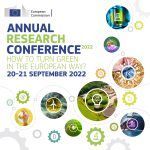From exciting space missions to the place where nuclear waste goes to die, these will be some of Europe’s most fascinating science stories of 2023.
The European Space Agency (ESA) will launch the Euclid space telescope to explore the universe’s evolution. It will create a 3D map of the universe as it orbits the Sun for several years. In April, ESA plans to launch the Jupiter Icy Moons Explorer to observe the giant gas planet and explore the ocean-bearing moons Europa, Callisto and Ganymede for signs of life. It’s expected to arrive at the Jupiter system in 2031.
Landmark global pact for climate justice
The 2022 United Nations Climate Change Conference (COP27) reached a groundbreaking agreement to provide funds to vulnerable countries hit hardest by climate-related disasters and to help in the recovery from damage and economic losses. Wealthy nations most responsible for high emissions will financially compensate developing countries and the people whose lives and livelihoods have been destroyed by the negative effects of climate change. A committee will make recommendations on how to coordinate these funding arrangements and present them at the next conference.
“COP27 marks a small step towards climate justice but much more is needed for the planet,” President of the European Commission Ursula von der Leyen commented in a statement. “We have treated some of the symptoms but not cured the patient from its fever. I am pleased that COP27 has opened a new chapter on financing loss and damage, and laid the foundations for a new method for solidarity between those in need and those in a position to help. We are rebuilding trust. This is crucial moving forward because there can be no lasting action against climate change without climate justice. The European Union is already the world’s leading contributor of international climate finance, and I am satisfied that we confirmed our commitment to support the most vulnerable on our planet through a first contribution on loss and damage.”
This is a breakthrough for poor countries. For several decades, they have been calling for financial assistance. 2023 will demonstrate whether it’s a big win for them or not.

Can brain training slow cognitive decline? |
Pushing the frontiers of physics and nuclear energy
In southern Sweden, one of the largest science and technology infrastructure projects is being built. The European Spallation Source facility’s main aim “is to build and operate the world’s most powerful neutron source, enabling scientific breakthroughs in research related to materials, energy, health and the environment, and addressing some of the most important societal challenges of our time .” Up to 3 000 guest researchers will perform experiments here in any given year, beginning in 2023.
An island off Finland’s southwestern coast will house the world’s first nuclear waste storage facility. About 400 metres below the ground, a specially built tomb is ready to receive spent nuclear fuel and keep it safely stored for about a million years. Sweden has begun constructing its own deep disposal site. France, Switzerland and the United Kingdom are next.
AI is shaping the future of humanity. To safeguard it, the EU intends to act as a watchdog and regulate AI by finalising the Artificial Intelligence Act – the first such legal framework anywhere. It will address AI risks for citizens while making Europe a top-notch hub for AI. Tech giants around the world will be keeping close tabs.
Source: CORDIS







Leave a Reply